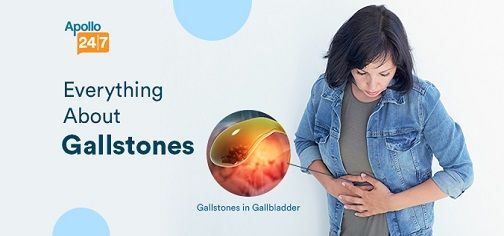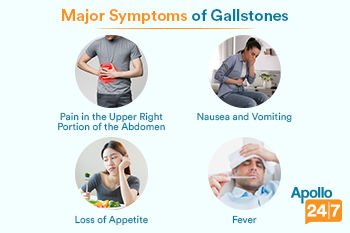General Health
Know Everything About Gallstones/Gallbladder stones
5 min read
By Apollo 24|7, Published on - 16 August 2022, Updated on - 07 August 2024
Share this article
0
0 like

Do you experience sudden mild pain on the right-hand side of the tummy or pain just below the breast bone? And does the pain usually last for 1 to 5 hours? If yes, it could be due to gallstones in your gallbladder. In this article, we will discuss gallbladder stone treatment without operation, gallbladder stone treatment with operation and gallstone operation cost. But before we discuss these, let’s first know what gallstones are, how they develop and who is at risk.
What Are Gallstones?
Gallstones are formed in the gallbladder when components of bile, such as cholesterol and bilirubin (a breakdown product of red blood cells), aggregate and form stones. The size of the stones varies from being small as a grain to as big as an apricot. Gallstones are thought to develop because of an imbalance in the chemical makeup of bile inside the gallbladder. In some cases, when cholesterol levels are very high the cholesterol itself can form stones and get deposited in the gallbladder.
How Long Does It Take For Gallstones To Develop?
It takes a few or many years for gallstones to develop and grow. There may be one or many stones the size of gravel, filling the gallbladder. Gallbladder stones are very common and once detected should not be left untreated for a long time. People who experience unbearable pain are likely to have multiple gallstones that can make them prone to sudden gallstone attacks which will require gallstone removal either laparoscopically or open surgery However, gallstones that do not cause any signs and symptoms typically don't need treatment, but still, it is better to get it checked routinely to avoid emergencies.
What Are The Symptoms Of Gallstones?
Surprisingly gallstones may cause mild pain or no signs and symptoms initially. However, if a gallstone gets stuck in the passage and results in a blockage, then one may experience the following
Sudden severe pain in the upper right portion of your abdomen
Rapidly intensifying pain in the centre of your abdomen
Back pain extending to the shoulder blades
Pain in the right side of the abdomen

Nausea and vomiting
Fever
Loss of appetite
Yellowing of skin
Note: Gallstone pain may last several minutes to a few hours. Sometimes even causing the patient to immediately get hospitalised.
Who Are At Risk Of Getting Gallstones?
It has been observed that gender, obesity and medications play a role in making people susceptible to getting gallstones.
People over 60
Women
People who are obese
People who take cholesterol-lowering drugs
People with dyslipidemia
People who secrete high amounts of insulin
People who consume a high-fat diet
People who take hormonal medication
How Are Gallstones Detected?
Gallstones are detected by a simple blood test that detects enzymes in the liver. Gallstones can be seen during an ultrasound scan which can help the doctor confirm the presence of tiny stones in the gallbladder. They are also visible on CT scans. It is important for the doctor to know the positioning of the gallstones because it determines the treatment plan, whether to treat gallbladder removal without operation or with the operation.
Can Gallstones Get Cured Without Surgery?
Yes, tiny gallstones can go away without surgery on their own. This can be achieved by drinking plenty of water, consuming apple cider vinegar, and castor oil and performing yoga regularly. All these are known to help in dissolving or flushing out tiny gallstones in the gallbladder, curing the problem. However, if the gallstones are large and too many then the doctor will suggest an operation of the gallbladder.
How Is Gallbladder Operated?
The gallbladder is operated either laparoscopically or with general surgery. In general surgery, the gallbladder is removed by making a larger incision as compared to laparoscopic surgery which is minimally invasive. In both types of surgeries, the patient recovers within 2-3 weeks and regains normalcy. Patients who undergo laparoscopy recover faster than patients who undergo normal surgery. However, post-surgery the patients are recommended to have a low-fat diet for lifelong to prevent digestive problems.
What Is The Cost Of Laparoscopic Gallbladder Removal?
The cost of a laparoscopic gallbladder removal in India is nominal and ranges between 80,000 to 1,50,000 Rupees. However, this is only an estimation, the actual rates may vary.
Why Should You Not Leave Gallstones Untreated?
When gallstones are left untreated, they can cause the bile duct or duodenum to get blocked. This blockage usually interferes with the digestive juices flowing to the pancreas. Over some time, it causes conditions such as jaundice and acute pancreatitis.
Treatment usually involves medications and the surgical removal of the gallbladder at the earliest. This is because gallstones can cause serious problems, including gallbladder inflammation, blocked bile ducts, infected bile ducts, and gallbladder cancer
1. Gallbladder inflammation (acute cholecystitis)
This happens when the gallstone ends up blocking the gallbladder which causes pain, fever, nausea and vomiting. This condition may at times cause hospitalisation followed by surgery.
2. Blocked bile ducts
This is a serious condition in which the skin turns yellow when a stone blocks the duct to your pancreas leading to pancreatitis. During this phase, one experiences fever, chills and vomiting.
3. Infected bile ducts
Infected bile duct is also known as acute cholangitis in which the blocked duct gets infected with microorganisms. Furthermore, if the bacteria spreads to the bloodstream it can also cause a very serious condition known as sepsis that requires immediate medical intervention.
4. Gallbladder cancer
Though it is very rare, gallstones can also lead to gallbladder cancer. One is recommended to seek a doctor's advice and not neglect gallstones if they are too many.
Takeaway
If you have gallstones then immediately start by consulting a general practitioner. Depending upon your condition, you may be referred to a doctor who specialises in dealing with gallstones such as a gastroenterologist/urologist or an abdominal surgeon who will either plan surgical removal of the gallbladder or plan a gallbladder stone treatment without operation. However, do not ignore doctors' advice and unnecessarily delay treatment. Doing so may cause severe pain along with an unprecedented gallbladder attack that may lead to hospitalisation.
Need expert advice?
Consult the Best Gallstone Doctors
- Medically Reviewed by Dr Dhanunjay Reddy B
General Health
Leave Comment
Recommended for you
.jpg?tr=q-80)
General Health
How To Control Thyroid In Female: Managing Thyroid Imbalance Through Diet And Lifestyle
Learn how to manage thyroid imbalance in females through diet and lifestyle changes. Discover effective tips for a healthier thyroid and improved well-being.

General Health
4 Reasons Your Annual Wellness Visit Should Get on Your Calendar
Learn about the importance of an annual wellness visit and how it can help you stay healthy. Also, explore the 4 reasons that make the annual visit a must.
.jpg?tr=q-80)
General Health
How Much CRP Level is Dangerous: Key Insights on Inflammation Risks
Learn about CRP levels, their normal range, and when high CRP levels are dangerous. Understand the health implications of elevated CRP and its link to inflammation.
Subscribe
Sign up for our free Health Library Daily Newsletter
Get doctor-approved health tips, news, and more.
Visual Stories

Science-backed Home Remedies for Burns and Blisters
Tap to continue exploring
Recommended for you
.jpg?tr=q-80)
General Health
How To Control Thyroid In Female: Managing Thyroid Imbalance Through Diet And Lifestyle
Learn how to manage thyroid imbalance in females through diet and lifestyle changes. Discover effective tips for a healthier thyroid and improved well-being.

General Health
4 Reasons Your Annual Wellness Visit Should Get on Your Calendar
Learn about the importance of an annual wellness visit and how it can help you stay healthy. Also, explore the 4 reasons that make the annual visit a must.
.jpg?tr=q-80)
General Health
How Much CRP Level is Dangerous: Key Insights on Inflammation Risks
Learn about CRP levels, their normal range, and when high CRP levels are dangerous. Understand the health implications of elevated CRP and its link to inflammation.